(含答案)新版人教版日语七年级第九课试卷化作业28
新版标准日本语同步测试卷1-12课选择题带答案
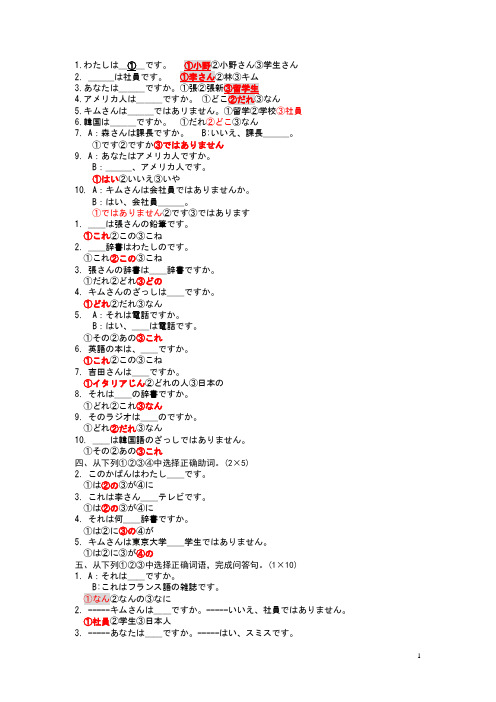
1.わたしは_①_です。
2. ___は社員です。
3.あなたは___ですか。
①張②張新③留学生4.アメリカ人は___ですか。
①どこ②だれ③なん5.キムさんは___ではあリません。
①留学②学校③社員6.韓国は___ですか。
①だれ②どこ③なん7. A:森さんは課長ですか。
B:いいえ、課長___。
①です②ですか③ではありません9. A:あなたはアメリカ人ですか。
B:___、アメリカ人です。
①はい②いいえ③いや10. A:キムさんは会社員ではありませんか。
B:はい、会社員___。
①ではありません②です③ではあります1.__は張さんの鉛筆です。
①これ②この③こね2.__辞書はわたしのです。
①これ②この③こね3.張さんの辞書は__辞書ですか。
①だれ②どれ③どの4.キムさんのざっしは__ですか。
①どれ②だれ③なん5. A:それは電話ですか。
B:はい、__は電話です。
①その②あの③これ6.英語の本は、__ですか。
①これ②この③こね7.吉田さんは__ですか。
①イタリアじん②どれの人③日本の8.それは__の辞書ですか。
①どれ②これ③なん9.そのラジオは__のですか。
①どれ②だれ③なん10.__は韓国語のざっしではありません。
①その②あの③これ四、从下列①②③④中选择正确助词。
(2×5)2.このかばんはわたし__です。
①は②の③が④に3.これは李さん__テレビです。
①は②の③が④に4.それは何__辞書ですか。
①は②に③の④が5.キムさんは東京大学__学生ではありません。
①は②に③が④の五、从下列①②③中选择正确词语,完成问答句。
(1×10)1.A:それは__ですか。
B:これはフランス語の雑誌です。
①なん②なんの③なに2.-----キムさんは__ですか。
-----いいえ、社員ではありません。
①社員②学生③日本人3.-----あなたは__ですか。
-----はい、スミスです。
①わたし②張さん③スミスさん4.-----それは__ですか。
安徽七年级日语试卷【含答案】
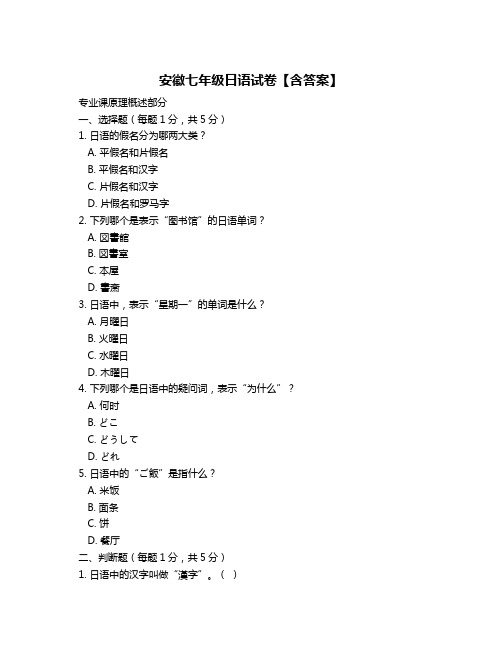
安徽七年级日语试卷【含答案】专业课原理概述部分一、选择题(每题1分,共5分)1. 日语的假名分为哪两大类?A. 平假名和片假名B. 平假名和汉字C. 片假名和汉字D. 片假名和罗马字2. 下列哪个是表示“图书馆”的日语单词?A. 図書館B. 図書室C. 本屋D. 書斎3. 日语中,表示“星期一”的单词是什么?A. 月曜日B. 火曜日C. 水曜日D. 木曜日4. 下列哪个是日语中的疑问词,表示“为什么”?A. 何时B. どこC. どうしてD. どれ5. 日语中的“ご飯”是指什么?A. 米饭B. 面条C. 饼D. 餐厅二、判断题(每题1分,共5分)1. 日语中的汉字叫做“漢字”。
()2. 日语的语法结构是主语-谓语-宾语。
()3. 在日语中,动词的变形主要依据说话人的尊敬程度。
()4. 日语的发音中没有声调的区别。
()5. “日本語”是日语中“日语”的写法。
()三、填空题(每题1分,共5分)1. 日语的______是表示动作或状态的基本词汇。
2. 在日语中,形容词的变形分为______和______两种。
3. 日语中的______是表示“不”的助动词。
4. 日语中的______是表示“和”的助词。
5. 日语中的______是表示“如果”的连词。
四、简答题(每题2分,共10分)1. 简述日语中的名词分为哪几类。
2. 描述日语中的动词变形规则。
3. 解释日语中的助词“は”和“が”的区别。
4. 简述日语中的敬语表达方式。
5. 解释日语中的“授受关系”表达。
五、应用题(每题2分,共10分)1. 请将下列句子翻译成日语:“我明天和朋友一起去公园。
”2. 请将下列句子翻译成中文:“彼は毎日学校に行く。
”3. 请用日语写出一段自我介绍。
4. 请用日语描述一下你的日常生活。
5. 请用日语列出五种你最喜欢的食物。
六、分析题(每题5分,共10分)1. 分析日语中的“て”形式动词的用法和意义。
2. 分析日语中的“可能态”和“被动态”的用法和区别。
七年级日语听力试卷【含答案】

七年级日语听力试卷【含答案】专业课原理概述部分一、选择题(每题1分,共5分)1. 以下哪个是日语中常用的礼貌语?A. ありがとうB. すみませんC. おはようD. さようなら2. 日语的假名分为哪两种?A. 平假名和片假名B. 平假名和汉字C. 片假名和汉字D. 平假名和罗马字3. 以下哪个是表示“不”的日语否定词?A. いいB. うんC. いいえD. ありがとう4. 以下哪个是日语中常用的疑问词?A. どうB. どこC. だれD. いつ5. 日语的语法结构通常是?A. 主语-谓语-宾语B. 主语-宾语-谓语C. 谓语-主语-宾语D. 宾语-主语-谓语二、判断题(每题1分,共5分)1. 日语中的汉字叫做“漢字”。
()2. 日语的发音中没有声调。
()3. “さようなら”是日语中常用的问候语。
()4. 日语中的动词变化形式有“ます形”和“ない形”。
()5. 日语中的形容词分为两类:い形容词和な形容词。
()三、填空题(每题1分,共5分)1. 日语的假名分为______和______。
2. 表示“不”的日语否定词是______。
3. 日语中的疑问词“だれ”意思是______。
4. 日语的语法结构通常是______-______-______。
5. 日语中的动词变化形式有______形和______形。
四、简答题(每题2分,共10分)1. 请写出日语中常用的礼貌语。
2. 请解释日语中的“漢字”是什么。
3. 请列举日语中的三种疑问词。
4. 请说明日语中的形容词分为哪两类。
5. 请解释日语中的“ます形”和“ない形”是什么。
五、应用题(每题2分,共10分)1. 请用日语写出“我明天去图书馆。
”2. 请用日语写出“这个苹果很甜。
”3. 请用日语写出“你叫什么名字?”4. 请用日语写出“我不喜欢吃辣的食物。
”5. 请用日语写出“昨天他去了电影院。
”六、分析题(每题5分,共10分)1. 请分析并解释日语中的语法结构。
新版中日交流标准日本语课堂同步每课练习册-初级上(含答案)
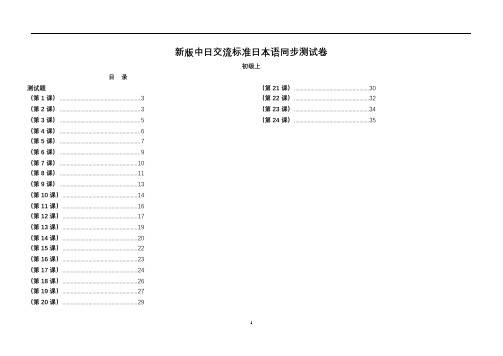
新版中日交流标准日本语同步测试卷初级上目录测试题(第1课) (3)(第2课) (3)(第3课) (5)(第4课) (6)(第5课) (7)(第6课) (9)(第7课) (10)(第8课) (11)(第9课) (13)(第10课) (14)(第11课) (16)(第12课) (17)(第13课) (19)(第14课) (20)(第15课) (22)(第16课) (23)(第17课) (24)(第18课) (26)(第19课) (27)(第20课)....................................................... 29 (第21课). (30)(第22课) (32)(第23课) (34)(第24课) (35)测试题答案(第1课) (38)(第2课) (38)(第3课) (38)(第4课) (39)(第5课) (39)(第6课) (40)(第7课) (40)(第8课) (40)(第9课) (41)(第10课) (41)(第11课) (41)(第12课)....................................................... 42 (第13课). (42)(第14课) (43)(第15课) (43)(第16课) (43)(第17课) (44)(第18课) (44)(第19课) (44)(第20课) (45)(第21课) (45)(第22课) (46)(第23课) (46)(第24课) (46)(第1课)一、将下列汉字改为平假名。
(1×10)1.学生2.中国人3.外国4.英語5.企画6.吉田7.日本8.会社員9.教授10.森二、将下列假名改为汉字。
(1×10)1.しゃいん2.ちゅうごく3.だいがくせい4.てんいん5.しゃちょう6.とうきょう7.しゃしん8.かちょう9.かいしゃ10.ひと三、从下列①②③中选择正确词语,完成句子。
【七年级上册语文作业本第九课答案人教版】 七年级上册语文作业本

【七年级上册语文作业本第九课答案人教版】七年级上册语文作业本应当随时学习,学习一切;应该集中全力,以求知道得更多,知道一切。
做七年级语文作业本题目应知难而进。
本文库整理了关于七年级上册语文作业本答案人教版,希望对大家有帮助!七年级上册语文作业本第九课答案人教版:王几何1、(1)臾(2)屏(3)绰(4)铭2、(1)安静(2)优雅(3)稀奇3、(1)洗耳恭听(2)哄堂大笑4、王老师给我们上第一节几何课的情形。
5、(1)这句话将王老师比喻成弥勒佛,既生动地写出了王老师的体形很胖,也突出了王老师的和蔼与慈祥。
(2)这句话中一连用了三个"最"字,木仅表明了"我"对这节课的印象深刻,也体现了王老师精湛的教学水平。
6、文章多次写到同学们的"笑",更能突出王老师业务精湛、幽默风趣、平易近人,是一位深受学生尊敬和喜爱的好老师,从而起到侧面烘托的作用。
7、同学们的"痛快"是因为王老师富有感染力的微笑、绝活表演、让学生到黑板上画圆和三角形等,王老师制造了喜剧效果,使学生身心彻底放松,情感得以自由发泄,充分享受了课堂带来的乐趣。
8、女孩听从"我"的告诫离开了博爱座,小男孩在"我"的规劝下收回要扔掉的空罐。
9、(1)通过动作描写,写出"我"不想让别人注意而让女孩难堪,体现了"我"对女孩的关心和尊重。
(2)把放学回家的小学生比作"叽叽喳喳的笼中群鸟",既写出了公交车的拥挤,也表达了作者对孩子们的喜爱。
10、示例一:女孩--我真是不应该,怎么会坐到博爱座上了,幸亏有好心人提醒,真是太感谢他了!示例二:男孩--我把空罐收回来了,没有随便扔,这是我应该做的。
谢谢你的提醒。
11、文章题目改为"告诫"不好,因为这篇文章作者要表达的是"告诫"应建立在"尊重"和"包容"上,"扬善公堂,规过私室"是"传道"的真理,所以题目要加上"哨悄的",这样的题目更能体现主茸。
12、作者这样安排段落给人一种强调的意味,不仅能突出"王老师"的形象,而且能让读者有置身其中的感觉。
标准日本语同步测试卷初级上含答案
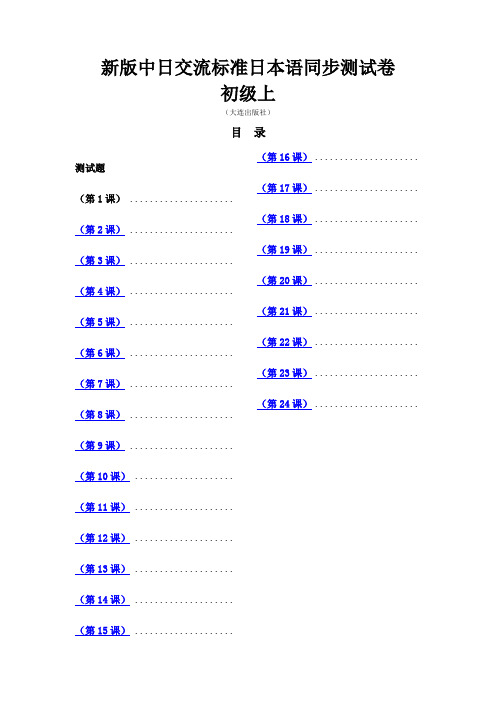
新版中日交流标准日本语同步测试卷初级上(大连出版社)目录测试题(第1课) ..................... (第2课) ..................... (第3课) ..................... (第4课) ..................... (第5课) ..................... (第6课) ..................... (第7课) ..................... (第8课) ..................... (第9课) ..................... (第10课) .................... (第11课) .................... (第12课) .................... (第13课) .................... (第14课) .................... (第15课) .................... (第16课)..................... (第17课)..................... (第18课)..................... (第19课)..................... (第20课)..................... (第21课)..................... (第22课)..................... (第23课)..................... (第24课).....................测试题答案(第1课) ..................... (第2课) ..................... (第3课) ..................... (第4课) ..................... (第5课) ..................... (第6课) ..................... (第7课) ..................... (第8课) ..................... (第9课) ..................... (第10课) .................... (第11课) .................... (第12课) .................... (第13课) .................... (第14课) .................... (第15课) .................... (第16课) .................... (第17课) .................... (第18课) .................... (第19课)..................... (第20课)..................... (第21课)..................... (第22课)..................... (第23课)..................... (第24课).....................(第1课)一、将下列汉字改为平假名。
初中7年级初一人教版部英语学案课件Unit 9课后作业及参考答案 (3)
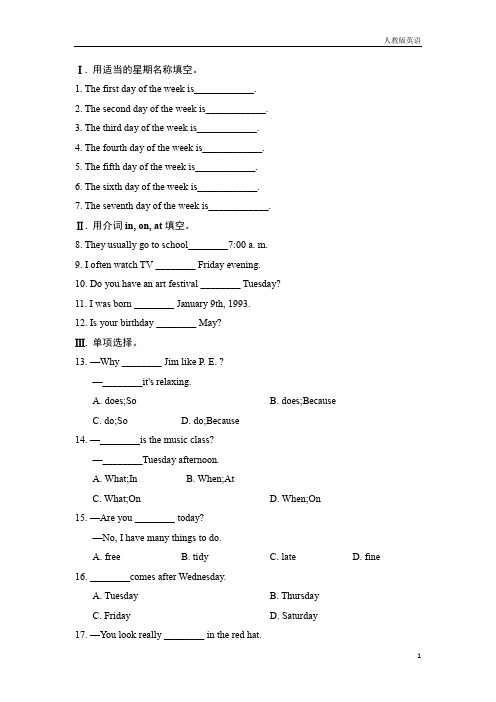
人教版英语Ⅰ. 用适当的星期名称填空。
1. The first day of the week is____________.2. The second day of the week is____________.3. The third day of the week is____________.4. The fourth day of the week is____________.5. The fifth day of the week is____________.6. The sixth day of the week is____________.7. The seventh day of the week is____________.Ⅱ. 用介词in, on, at填空。
8. They usually go to school________7:00 a. m.9. I often watch TV ________ Friday evening.10. Do you have an art festival ________ Tuesday?11. I was born ________ January 9th, 1993.12. Is your birthday ________ May?Ⅲ. 单项选择。
13. —Why ________ Jim like P. E. ?—________it's relaxing.A. does;SoB. does;BecauseC. do;SoD. do;Because14. —________is the music class?—________Tuesday afternoon.A. What;InB. When;AtC. What;OnD. When;On15. —Are you ________ today?—No, I have many things to do.A. freeB. tidyC. lateD. fine16. ________comes after Wednesday.A. TuesdayB. ThursdayC. FridayD. Saturday17. —You look really ________ in the red hat.—Thank you.A. oldB. bigC. coolD. short Ⅳ. 按要求完成句子。
初中新版日语教材练习题(1-4)
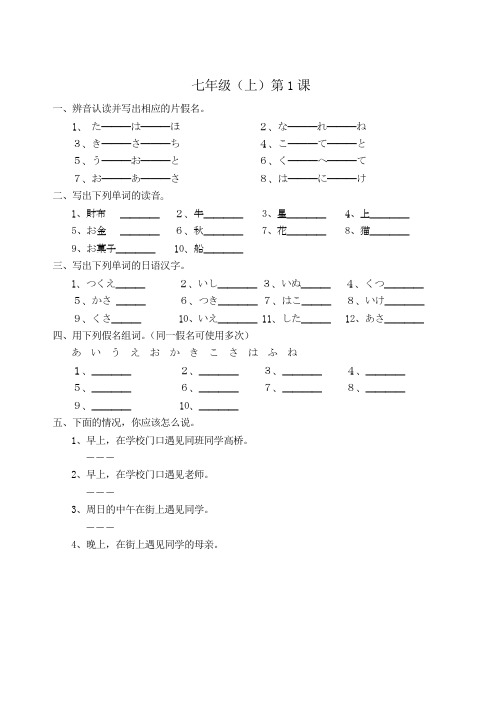
七年级(上)第1课一、辨音认读并写出相应的片假名。
1、た―――は―――ほ2、な―――れ―――ね3、き―――さ―――ち4、こ―――て―――と5、う―――お―――と6、く―――へ―――て7、お―――あ―――さ8、は―――に―――け二、写出下列单词的读音。
1、財布____2、牛____ 3、星____ 4、上____5、お金____6、秋____ 7、花____ 8、猫____9、お菓子____ 10、船____三、写出下列单词的日语汉字。
1、つくえ___2、いし____3、いぬ___4、くつ____5、かさ___6、つき____7、はこ___8、いけ____9、くさ___ 10、いえ____ 11、した___ 12、あさ____四、用下列假名组词。
(同一假名可使用多次)あいうえおかきこさはふね1、____2、____3、____4、____5、____6、____7、____8、____9、____ 10、____五、下面的情况,你应该怎么说。
1、早上,在学校门口遇见同班同学高桥。
―――2、早上,在学校门口遇见老师。
―――3、周日的中午在街上遇见同学。
―――4、晚上,在街上遇见同学的母亲。
第2课一、辨音认读并写出相应的片假名。
1、な―――た―――ば―――だ2、し―――つ―――の―――へ3、れ―――ね―――ぬ―――わ4、う―――り―――ら―――ろ5、は―――ほ―――ぼ―――よ6、て―――へ―――の―――と7、き―――ま―――も―――ぎ8、ろ―――る―――ら―――め二、按五十音图的顺序填写假名。
三、写出下列单词的读音。
1、眼鏡____2、靴屋____3、空____4、山____5、電話____6、魚屋____7、鳥____8、車____9、本屋____10、袋____11、果物____12、私____四、写出下列单词的日语汉字。
1、くすり___2、てがみ___3、にし___4、みち___5、やおや___6、くだもの___7、ちず___8、くも___9、はがき___10、えき___11、ふくろ___12、ひがし___五、写出下列外来语单词。
七年级日语试卷【含答案】

七年级日语试卷【含答案】专业课原理概述部分一、选择题(每题1分,共5分)1. 日语的母语者是哪个国家的人?A. 中国B. 韩国C. 日本D. 美国2. 日语中的“ありがとう”是什么意思?A. 感谢B. 对不起C. 没关系D. 再见3. 日语中“さようなら”是什么意思?A. 你好B. 晚安C. 再见D. 对不起4. 日语中“おはようございます”是什么意思?A. 晚安B. 早上好C. 下午好D. 晚上好5. 日语中“すみません”是什么意思?A. 对不起B. 没关系C. 谢谢D. 请二、判断题(每题1分,共5分)1. 日语是中国的官方语言。
()2. 日语中“はい”表示“是”。
()3. 日语中“いいえ”表示“不是”。
()4. 日语中“おばあさん”表示“姐姐”。
()5. 日语中“おじいさん”表示“爷爷”。
()三、填空题(每题1分,共5分)1. 日语的假名有______种。
2. 日语的平假名是从______演变而来的。
3. 日语的片假名是从______演变而来的。
4. 日语的汉字叫做______。
5. 日语中的“にほんご”表示______。
四、简答题(每题2分,共10分)1. 简述日语的发音特点。
2. 简述日语的语法特点。
3. 简述日语的敬语特点。
4. 简述日语的词汇特点。
5. 简述日语的书写特点。
五、应用题(每题2分,共10分)1. 请用日语写出“我爱你”。
2. 请用日语写出“明天见”。
3. 请用日语写出“我饿了”。
4. 请用日语写出“你是谁?”5. 请用日语写出“对不起,我迟到了。
”六、分析题(每题5分,共10分)1. 分析日语中动词的变形规律。
2. 分析日语中形容词的变形规律。
七、实践操作题(每题5分,共10分)1. 请用日语进行自我介绍。
2. 请用日语描述一下你的学校。
八、专业设计题(每题2分,共10分)1. 设计一个简单的日语学习计划,包括每天的学习内容和目标。
2. 设计一个日语角的活动方案,包括活动主题、流程和所需材料。
新标日初级上册阶段性测试试卷(8—10课)doc
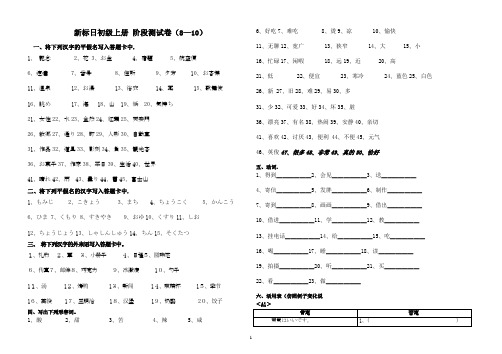
新标日初级上册阶段测试卷(8—10)一、将下列汉字的平假名写入答题卡中.1、記念2、花3、お金4、宿題5、航空便6、速達7、番号8、住所9、夕方 10、お客様11、温泉12、お湯 13、浴衣 14、薬 15、歌舞伎16、眺め 17、海 18、山 19、紙 20、気持ち21、女性22、水23、全然24、紅葉25、天安門26、故郷27、通り28、町29、人形30、自動車31、作品32、道具33、彫刻34、魚35、観光客36、お菓子37、作家38、平日39、生活40、世界41、晴れ42、雨43、曇り44、雪45、富士山二、将下列平假名的汉字写入答题卡中.1、もみじ2、こきょう3、まち4、ちょうこく5、かんこう6、ひま7、くもり8、すきやき9、おゆ10、くすり11、しお12、ちょうじょう13、しゃしんしゅう14、ちん15、そくたつ三、将下列汉字的外来语写入答题卡中。
1、礼物2、票3、小册子4、日程5、圆珠笔6、传真7、邮件8、巧克力9、冰激凌10、勺子11、汤 12、烤鸭13、新闻14、玻璃杯15、季节16、英俊17、三明治18、汉堡 19、奶酪 20、饺子四、写出下列形容词。
1、酸2、甜3、苦4、辣5、咸6、好吃7、难吃8、烫9、凉 10、愉快11、无聊12、宽广 13、狭窄 14、大 15、小16、忙碌17、闲暇 18、远19、近 20、高21、低 22、便宜 23、寒冷 24、蓝色25、白色26、新 27、旧28、难29、易30、多31、少32、可爱33、好34、坏35、脏36、漂亮37、有名38、热闹39、安静40、亲切41、喜欢42、讨厌43、便利 44、不便45、元气46、英俊47、很多48、非常49、真的50、恰好五、动词.1、得到______2、会见______3、送______4、寄信______5、发胖______6、制作______7、寄到______8、画画______9、借出______10、借进______11、学______12、教______13、挂电话______14、给______15、吃______16、喝______17、睡______18、读______19、拍摄______20、听______21、买______22、看______23、做______六、活用表(仿照例子变化说<A1>20、话说,图书馆怎么没人?1、小李用日语给妈妈写信。
人教版七年级下册Unit9练习题含答案
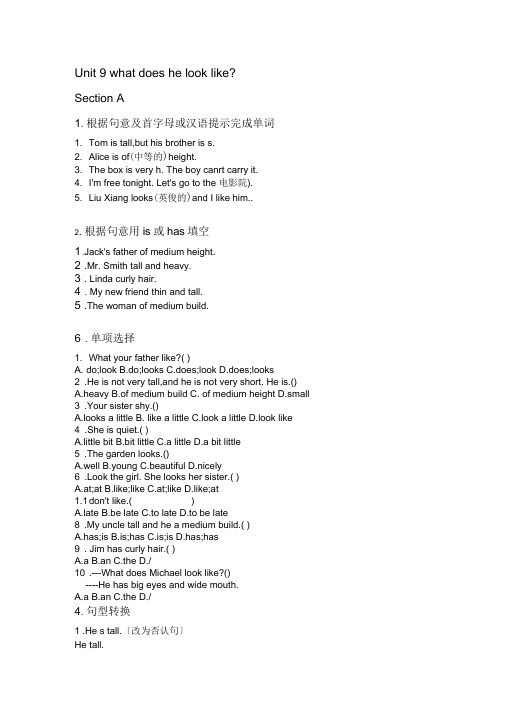
Unit 9 what does he look like?Section A1.根据句意及首字母或汉语提示完成单词1. Tom is tall,but his brother is s.2. Alice is of(中等的)height.3. The box is very h. The boy canrt carry it.4. I'm free tonight. Let's go to the 电影院).5. Liu Xiang looks(英俊的)and I like him..2.根据句意用is或has填空1 .Jack's father of medium height.2 .Mr. Smith tall and heavy.3 . Linda curly hair.4 . My new friend thin and tall.5 .The woman of medium build.6 .单项选择1. What your father like?( )A. do;lookB.do;looksC.does;lookD.does;looks2 .He is not very tall,and he is not very short. He is.()A.heavyB.of medium buildC. of medium heightD.small3 .Your sister shy.()A.looks a littleB. like a littleC.look a littleD.look like4 .She is quiet.( )A.little bitB.bit littleC.a littleD.a bit little5 .The garden looks.()A.wellB.youngC.beautifulD.nicely6 .Look the girl. She looks her sister.( )A.at;atB.like;likeC.at;likeD.like;at1.1 don't like.( )teB.be lateC.to lateD.to be late8 .My uncle tall and he a medium build.( )A.has;isB.is;hasC.is;isD.has;has9 . Jim has curly hair.( )A.aB.anC.theD./10 .---What does Michael look like?()----He has big eyes and wide mouth.A.aB.anC.theD./4.句型转换1 .He s tall.〔改为否认句〕He tall.2 .She is not too heavy or too light.改为同义句〕She is.3 .Tom is of medium height.附划线局部提问〕does Tom ________________4 .She wears a blue sweater today改为一般疑问句〕 she a blue sweater today?5 .Does she have short curly hair?做否认答复〕 , she.6 . She wears a white uniform.改为否认旬〕She a white uniform.5.完形填空My name is Linda. Amy is my best friend. She 1 long straight black hair and two big black eyes.2 nose is very small. She is beautiful. She is 3 ,too. Amy likes animals,so she 4 helps her grandparents take care of their cat and dog. She is also a 5 student in my class. She studies very hard 6 she often helps other students. After school,we often play together. We 7 swimming very much,so summer is our favourite season.She is not the only 8 in her family. She has a sister of only three years old. Her name is Lucy. Lucy is a cute girl. She 9 me sister the first time I see to every 10 . When we go to the park,she wants to go to the park,too. When we read at home,she wants to read,too. How funny!1. A.knows B.sees C.buys D.has2. A.Its B.His C.Her D.Your3. A.scary B.cute C.heavy D.tired4. A.often B.only C.never D.most5. A.hard B.dangerous zy D.good6. A.and B.but C.because D.if7. A.stop B.watch C.like D.remember8. A.parent B.child C.boy D.student9. A.tells B.says C.hopes D.calls10. A.home B.place C.time D.schoolSection B1 .用所给单词的适当形式填空2 .There are three〔person〕 in my family.3 .What does your friend(look) like?4 .He(look) young.5 .Jay Chou is a good(sing).6 .We each(have) a pen.7 .We usually describe the same things(different).8 .Nick often(put) his pen in the box.9 .单项填空1.1 d on't like the pen. Please show me one.A.the otherB.otherC.anotherD.others2 .---What does Marx like?A.He wears glasses.B.He is of medium heightC.He likes to help peopleD. He has short hair.3 . I have much work to do. I m busy.A. a bit ofB. a littleC. a lotD.a few 4.---does she look like?----Her mother , I think.A.WhatB.WhereC.HowD.Who5 . Shes just 45, but she has white hairs.A.a fewB.muchC.lot ofD.a little6 .---Are you hungry?A.A littleB.A bit littleC.A bit ofD.Bit 7.---What does your brother look like?A.He likes watching TV.B. He is a worker in a factory.C.He is very tall and strong.D.He plays basketball every day3.句型转换1. There isnt anybody here.帔为同义句)There here.2. That man is my math teacher. He wears a pair of funny glasses.(并成一句话)That man ________________________________________ is my math techer.3. She has blond hair.改为一般疑问句) she blond hair?4, He has many books.K寸划线局部提问)_________________ he _________4. Johnny wears glasses改为否认句)Johnny glasses.4根据句意及首字母提示完成短文Linda is my new friend. Do you k 1 her? What does she l 2 like? Let me tell you.She s of m 3 ___________ height,but a l 4 heavy. She has long blonde s 5hair. She always wears g 6 . She loveto tell j 7.She is the captain伙长〕of our volleyball t 8 . She is very p 9 in our school.She wants to be a s 10 when she grow up,because she likes singing. 1. 2. 3. 4. 5.6. 7.8.9.10.Self Check1 .阅读理解There is a nice girl in our class. She is thirteen years old. She is not tall and she is not short,either. She is a little bit heavy. She has a round face like an apple. She has big black eyes and a small nose. Her mouth is big, but ears are small. Her hair is short and black. She likes red. She is often in red clothes.But today she is wearing a yellow sweater,blue pants and brown shoes. She likes little animals. She has a little black dog at home. She and the dog aregood friends.根据短文内容,答复下面问题.1 .How old is the girl?2 .What does the girls face look like?3 .What color is the girl s hair?4 .What color does the girl like?5 .What animal does the girl have at home?2.完形填空Carol and Susan are very good friends They are in the same _1_ at school and they often visit _2_ home at weekends. Now they are _3_ eight years old. Car ol's mother has got a new baby. Carol is very _14_ to have a little sister. So she is always talking about her to Susan. At first she is very _5_ in the new babybecause she doesn't have any brothers or sisters. But _6_ some time she begi ns to get tired of Carol's endless talking about it. She also fells a little jealous 〔嫉妒〕of her friend.One morning when the two girls _7_ in the school ground, Carol says to Susa n, "Do you _8_, Sue, my baby sister has put on nearly half a pound in weight this week." "That is not very _9_.〞 answers Susan. "I know a baby and he put s on ten pounds a day." "Oh, that can't be _10_." answers Carol laughingly."Whose baby is it " "An elephant's" says Susan.1. A. grade B. table C. class D. group2. A. each other's B. their C. theirs D. each other3. A. all B. two C. both D. either4. A. angry B. sorry C. surprised D. glad5. A. interesting B. interested C. happy D. satisfied 〔感至U满意的〕6. A. before B. for C. after D. at7. A. play B. meet C. weight D. walk8. A. hear B. think C. find D. know9. A. much B. many C. few D. little10. A. impossible B. wrong C. true D. sure3.书面表达描述一下你的英语老师的外貌和上课情况. 要求:80个单词左右.参考答案Section A一、1 — 5 CABDE二、1. but 2. build 3. hair 4. gets 5. newspapers 6. glasses 7. playing 8. old 9. never 10. can 't 三、1. Five years old.2. Mark.3. He has a long face, two big black eyes and a big nose. His hair is black and very short. He isn't very tall.4. He wears a dark blue T-shirt and light yellow trousers5. He likes cars.Section B一、1 — 5 EDBAC二、1. He has glasses with small round frames.2. It's blue.3. He has long yellow hair and it ’ s really straight.4. 我中等个子,留着短发.5. A三、My good friend is Mr. Smith. He is a short man with long hair. He comes from America. He is forty years old. He is very friendly to us. He often draws funny cartoons on the blackboard. He is very smart, too. He often tells interesting stories to the class. He teaches us English. I like him very much.。
飞鸟7年级日语试卷【含答案】
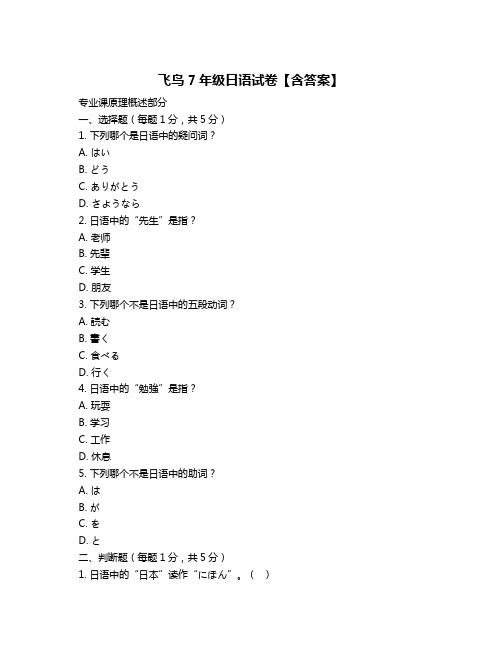
飞鸟7年级日语试卷【含答案】专业课原理概述部分一、选择题(每题1分,共5分)1. 下列哪个是日语中的疑问词?A. はいB. どうC. ありがとうD. さようなら2. 日语中的“先生”是指?A. 老师B. 先辈C. 学生D. 朋友3. 下列哪个不是日语中的五段动词?A. 読むB. 書くC. 食べるD. 行く4. 日语中的“勉強”是指?A. 玩耍B. 学习C. 工作D. 休息5. 下列哪个不是日语中的助词?A. はB. がC. をD. と二、判断题(每题1分,共5分)1. 日语中的“日本”读作“にほん”。
()2. 日语中的动词变形只有一种形式。
()3. 日语中的形容词分为い形容词和な形容词两种。
()4. 日语中的“水”读作“すい”。
()5. 日语中的数字“一”读作“いち”。
()三、填空题(每题1分,共5分)1. 日语中的“你好”是“_______”。
2. 日语中的“谢谢”是“_______”。
3. 日语中的“再见”是“_______”。
4. 日语中的“学生”是“_______”。
5. 日语中的“学校”是“_______”。
四、简答题(每题2分,共10分)1. 请写出日语中的五个基本句型。
2. 请解释日语中的“は”和“が”的区别。
3. 请列举出日语中的三个形容词。
4. 请写出日语中的五个数字。
5. 请解释日语中的“勉強”和“学ぶ”的区别。
五、应用题(每题2分,共10分)1. 请用日语翻译:“我每天早上七点起床。
”2. 请用日语翻译:“我喜欢吃寿司。
”3. 请用日语翻译:“他昨天去了图书馆。
”4. 请用日语翻译:“我们下周二有考试。
”5. 请用日语翻译:“她正在学习英语。
”六、分析题(每题5分,共10分)1. 请分析日语中的动词变形及其用法。
2. 请分析日语中的助词及其用法。
七、实践操作题(每题5分,共10分)1. 请用日语进行自我介绍。
2. 请用日语描述一下你的日常生活。
八、专业设计题(每题2分,共10分)1. 设计一个简单的日语学习计划,包括每天的学习内容和目标。
人教版七上unit9习题附答案
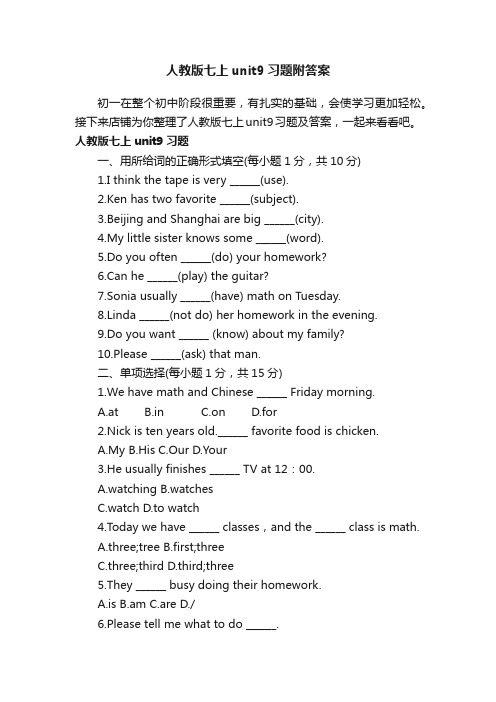
人教版七上unit9习题附答案初一在整个初中阶段很重要,有扎实的基础,会使学习更加轻松。
接下来店铺为你整理了人教版七上unit9习题及答案,一起来看看吧。
人教版七上unit9习题一、用所给词的正确形式填空(每小题1分,共10分)1.I think the tape is very ______(use).2.Ken has two favorite ______(subject).3.Beijing and Shanghai are big ______(city).4.My little sister knows some ______(word).5.Do you often ______(do) your homework?6.Can he ______(play) the guitar?7.Sonia usually ______(have) math on Tuesday.8.Linda ______(not do) her homework in the evening.9.Do you want ______ (know) about my family?10.Please ______(ask) that man.二、单项选择(每小题1分,共15分)1.We have math and Chinese ______ Friday morning.A.atB.inC.onD.for2.Nick is ten years old.______ favorite food is chicken.A.MyB.HisC.OurD.Your3.He usually finishes ______ TV at 12:00.A.watchingB.watchesC.watchD.to watch4.Today we have ______ classes,and the ______ class is math.A.three;treeB.first;threeC.three;thirdD.third;three5.They ______ busy doing their homework.A.isB.amC.areD./6.Please tell me what to do ______.A.andB.and thenC.thenD.next7.Science is difficult ______ interesting.A.butB.andC.orD.so8.—When do you ______?—______ Monday,Wednesday and Friday.A.have math;OnB.have a math;AtC.have math;AtD.have a math;On9.______ is the fifth day in a week.A.WednesdayB.ThursdayC.FridayD.Saturday10.—______ is it?—It's 8:00 in the morning.A.WhenB.What timeC.WhereD.What11.—Why don't you like English? —Because it's ______.A.interestingB.funC.excitingD.difficult12.—What ______ do you like best? —Football.A.foodB.subjectC.sportD.music13.Jim likes ______ games with me.A.playB.playingC.playsD.playes14.—______do you like music? —Because it's relaxing.A.WhyB.WhenC.HowD.What15.I like math______ I like P.E.A.andB.butC.becauseD.so三、完形填空(每小题2分,共20分)Hi!I'm Cheng Ling.I'm a__1__of Class 3,Grade 7.My school life is very__2__.We have four classes in the __3__.Classes begin at 8 o'clock.In the afternoon,we have two classes.We have English,science,history,music and __4__other subjects.__5__is my favorite subject.I often sing and dance with my classmates on weekends.But I__6__science,because I think it's difficult and__7__.Do you think so?After school,I often play soccer with__8__friends.Sometimes I swim in a swimming club.But my favorite sport is volleyball.And I can play it__9__.I like my school life very much.__10__you tell me about your school life?1.A.runner B.student C.musician D.teacher2.A.scary B.boring C.interesting D.difficult3.A.night B.afternoon C.evening D.morning4.A.some B.any C.a lot D.a little5.A.History B.Music C.Math D.Science6.A.don't like B.doesn't like C.like D.likes7.A.relaxing B.interesting C.boring D.fun8.A.our B.her C.his D.my9.A.nice B.fine C.well D.good10.A.Can B.Do C.Are D.Does四、阅读理解(每小题2分,共30分)AMy name is Cindy.I'm thirteen years old this year.I'm a middle school student.I'm in Class Three,Grade Seven.I have some new subjects this year.They are science and history.My favorite day is Thursday because I have science on that day.I have a twin sister(孪生姐姐).Her name is Sonia.She is also amiddle school student.She is in Class Six,Grade Seven.She likes English.Her favorite day is Monday because she has English on that day.My father is Mr.White.He is a math teacher.His favorite day is Sunday because he can go to the baseball club.He likes playing baseball.My mother is Mrs.White.She is a clerk at Huaxing Clothes Store.Her favorite day is Saturday because on that day she doesn't go to work.And she can play tennis with her friends.Oh,my mother likes playing tennis.1.Cindy's favorite subject is ______.A.scienceB.historyC.mathD.English2.Sonia is ______ years old this year.A.sevenB.nineC.thirteenD.fourteen3.Mr.White has two ______.A.sonsB.sistersC.brothersD.daughters4.On ______,Mr.White usually goes to the baseball club.A.SaturdayB.MondayC.ThursdayD.Sunday5.Mrs.White works in a ______.A.clubB.hotelC.schoolD.storeBAmerican school begins in September after a long summer vacation.There are two terms in a school year:the first term is from September to January,and the second is from February to June.Most American children go to public schools(公立学校).High school students take only four or five subjects at a time.They usually go to the same classes every day,and they have an assignment(课外作业) for every class.After class they have many activities.After high school,many students go to college.6.Most American children start school life in ______.A.SeptemberB.FebruaryC.JuneD.July7.American children have______vacations each year.A.oneB.twoC.threeD.four8.Students in the high school have ______subjects at a time.A.fourB.fiveC.sixD.four or five9.Which of the following is wrong?A.In July students don't need to go to school because of vacation.B.Students have the same classes every day.C.Students don't have homework for every class.D.Most American children go to public schools.10.After class students ______.A.do homeworkB.go back homeC.have many activitiesD.go to moviesCTom is ten years old this year.He is in Grade Two(二年级).He doesn't work hard at school.His teacher doesn't like him.But Tom thinks he is the cleverest student(最聪明的学生)in his class.And he thinks his math(数学)is good.On a Sunday afternoon,T om goes home.He feels very hungry.So he says to his mother,“Mom,I am very hungry.Can I have some food to eat?”“Supper is not ready now,but there are two cakes on the plate.You can eat them first.”When he sees the two cakes,Tom says,“Mother,I have three cakes now.Look!This is the first cake.This is the second cake.One and two is three.I am very clever.”“Yes,you're very clever,”says his mother.“Now give me the first cake,your father will eat the second cake,and you eat the third one.”11.Tom's teacher doesn't like him because ______.A.he doesn't work hard at schoolB.he doesn't listen to his teacher in classC.he doesn't do his homeworkD.he doesn't go to school on time12.Tom thinks his ______ is good. wA.EnglishB.mathC.ChineseD.homework13.One day when Tom goes home,he feels ______.A.happyB.sadC.hungryD.thirsty14.Where are the two cakes?A.On the plate.B.On the table.C.On the bed.D.On the chair.15.Can Tom eat the third cake?A.No,he can't.B.No,he can.C.Yes,he is right.D.Yes,he can't.五、书面表达(共15分)假如你是艾伦(Alan),下面是你周四一天的学校生活。
【VIP专享】新版标准日本语初级上册 第9课
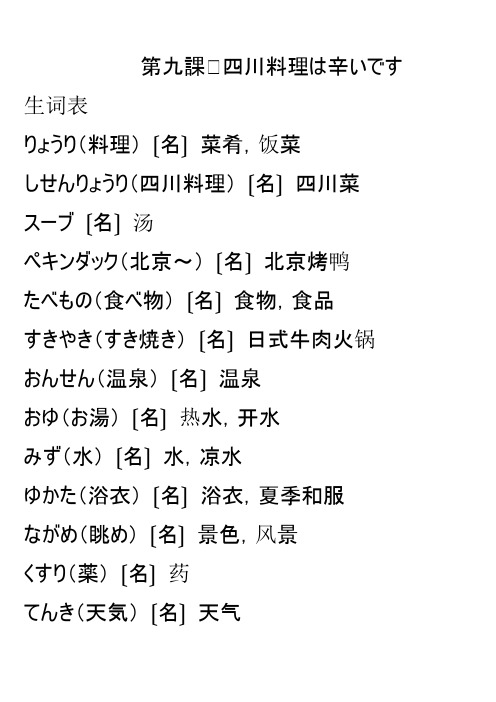
第九課 四川料理は辛いです生词表りょうり(料理)〔名〕菜肴,饭菜しせんりょうり(四川料理)〔名〕四川菜スーブ〔名〕汤ぺキンダック(北京~)〔名〕北京烤鸭たべもの(食べ物)〔名〕食物,食品すきやき(すき焼き)〔名〕日式牛肉火锅おんせん(温泉)〔名〕温泉おゆ(お湯)〔名〕热水,开水みず(水)〔名〕水,凉水ゆかた(浴衣)〔名〕浴衣,夏季和服ながめ(眺め)〔名〕景色,风景くすり(薬)〔名〕药てんき(天気)〔名〕天气うみ(海)〔名〕大海やま(山)〔名〕山かみ(紙)〔名〕纸ニュース〔名〕新闻じょせい(女性)〔名〕女性おきゃくさま(お客様)〔名〕来宾グラス〔名〕玻璃杯かぶき(歌舞伎)〔名〕歌舞伎きもち(気持ち)〔名〕心情たくさん〔名〕很多からい(辛い)〔形1〕辣あまい(甘い)〔形1〕甜しおからい(塩辛い)∕しょっぱい〔形1〕咸すっぱい(酸っぱい)〔形1〕酸にがい(苦い)〔形1〕苦おいしい〔形1〕好吃,可口まずい〔形1〕不好吃,难吃あつい(熱い)〔形1〕热,烫つめたい(冷たい)〔形1〕凉たのしい(楽しい)〔形1〕愉快,快乐おもしろい(面白い)〔形1〕有趣,有意思つまらない〔形1〕无聊ひろい(広い)〔形1〕广阔,宽敞せまい(狭い)〔形1〕狭窄おおきい(大きい)〔形1〕大ちいさい(小さい)〔形1〕小いそがしい(忙しい)〔形1〕忙,忙碌いい〔形1〕好わるい(悪い)〔形1〕不好,坏すばらしい(素晴らしい)〔形1〕极好,绝佳とおい(遠い)〔形1〕远ちかい(近い)〔形1〕近たかい(高い)〔形1〕高,贵ひくい(低い)〔形1〕低やすい(安い)〔形1〕便宜さむい(寒い)〔形1〕寒冷あつい(暑い)〔形1〕(天气)热あおい(青い)〔形1〕蓝色的しろい(白い)〔形1〕白色的あたらしい(新しい)〔形1〕新ふるい(古い)〔形1〕旧むずかしい(難しい)〔形1〕难やさしい(易しい)〔形1〕容易おおい(多い)〔形1〕多すくない(少ない)〔形1〕少かわいい(可愛い)〔形1〕可爱ほんとうに(本当に)〔副〕真的,实在是あまり〔副〕不(太)~,不很~とても∕たいへん〔副〕很,非常すこし(少し)∕ちょっと〔副〕一点儿ぜんぜん(全然)〔副〕根本(不),全然(不)ちょうど〔副〕正好,恰好あら∕あれ〔叹〕哎呀,咦ああ〔叹〕啊てんあんもん(天安門)〔专〕天安门ばんりのちょうじょう(万里の長城)〔专〕万里长城_____________________________________きもちがいい(気持ちがいい)感觉舒服,心情愉快~用よう语法1. 日语中形容词分两类(修饰名词)一类形容词(形容词):以「い」结尾,起修饰作用二类形容词(形容动词)①一类形容词做谓语(用于句末)现在肯定~いです现在否定 ~い→~くないです/~くありません过去肯定 ~い→~かったです过去否定 ~い→~くなかったです/~くありませんでした注:「いい」 いいです よくないです/よくありません よかったです よくなかったです/よくありませんでしたP120 2、3②一类形容词做定语(修饰名词)~い直接加名词○この鞄は大きいです。
人教版日语七年级单词9-12
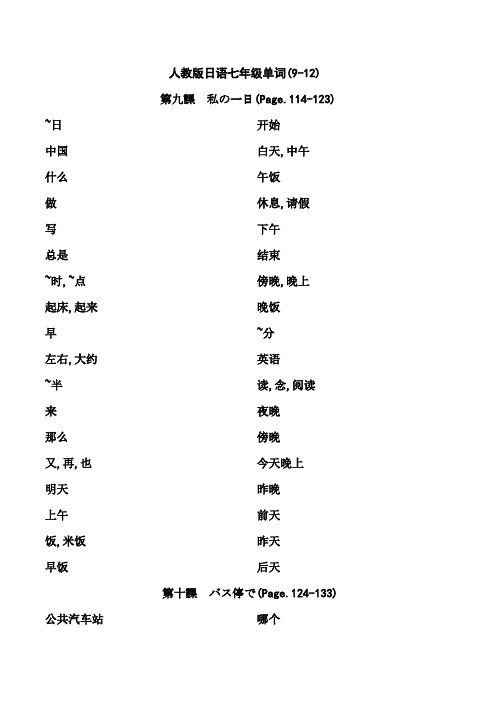
人教版日语七年级单词(9-12)第九課私の一日(Page.114-123)~日中国什么做写总是~时,~点起床,起来早左右,大约~半来那么又,再,也明天上午饭,米饭早饭开始白天,中午午饭休息,请假下午结束傍晚,晚上晚饭~分英语读,念,阅读夜晚傍晚今天晚上昨晚前天昨天后天第十課バス停で(Page.124-133)公共汽车站哪个请问第~号,~路(车) 医院去日本(尊称)人连环画,漫画借入,借来怎样有趣但是,可是后年难旅行,旅游工作,职业什么时候万里长城照(相) 明十三陵去年前年今年明年星期日星期一星期二星期三星期四星期五星期六星期几---------------------------------------------------------------------第十一課応援(Page.134-143)助威,援助(球类)比赛~们坚持,努力好,好的~语言,~语日语职员,工作人员很;实在是…体育馆天气,好天气笛子,口哨一起做,制作~根,~条(物体的)声音,声响大家,全体射门太好了,太棒了赢,获胜对方团队强,强壮,强烈弱,不擅长~回,~次~层~个第~--------------------------------------------------------------------- 第十二課夏休みの思い出(Page.144-153)夏天暑假回忆,回想里面,家里内蒙古啊,哦远祭祀,祭日马乘坐,骑(车) 蒙古族歌曲唱歌菜肴,做菜餐厅,餐馆附近有名下次,这回上上周上星期这星期下周下下周上上月上个月这个月下月下下月(我)祖父,外祖父(我)祖母,外祖母哥哥小大狭窄宽广,宽敞(我)哥哥(我)姐姐(我)妹妹1月2月3月4月5月6月7月8月9月10月11月12月_________________________________ ◎交际与表达询问(反问)美月你呢?(进一步询问)什么样的作业?(回应)是吗?搭话用语 /回应搭话打听某个信息开场白鼓励(同辈晚辈)(体育赛事)鼓励选手与对方分享喜悦心情(太好了)自己或自己所属团队成功了提议(把握不大)提议(比较有把握)表达羡慕/称赞询问对方做某事的经验(…怎么样?)。
最新七年级2010-2011第一学期初一日语期末考
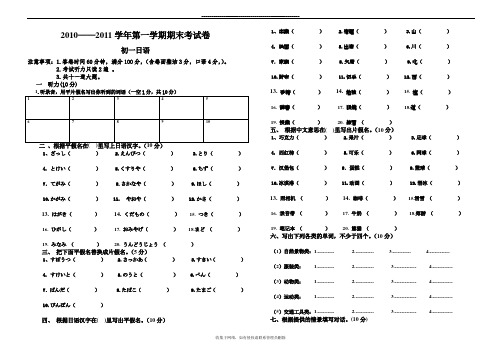
2010——2011学年第一学期期末考试卷初一日语注意事项:1.答卷时间60分钟,满分100分,(含卷面整洁3分,口语4分,)。
2.考试听力只读2遍。
3.共十一道大题。
一听力(10分)1、ざっし() 2.えんぴつ() 3.とり()4. とけい()5.くすりや()6.ちず()7.てがみ() 8.さかなや()9.ほし()10.かがみ() 11.やおや() 12.かさ()13. はがき()14. くだもの()15. つき()16. ひがし()17. おみやげ()18.まど()19. みなみ()20. うんどうじょう()三、把下面平假名替换成片假名。
(5分)1、すぽうつ() 2.さっかあ() 3.すきい()4. すけいと()5.のうと()6.ぺん()7.ぱんだ()8.たばこ()9.たまご()10.ぴんぽん()四、根据日语汉字在( )里写出平假名。
(10分)1、卒業() 2.宿題() 3.山()4. 映画()5.出席()6.川()7.家族() 8.欠席() 9.北()10.財布() 11.切手() 12.西()13. 砂糖()14. 勉強()15. 塩()16. 辞書()17. 眼鏡()18.道()19. 授業()20. 練習()五、根据中文意思在( )里写出片假名。
(10分)1、巧克力() 2.果汁() 3.足球()4. 西红柿() 5.可乐() 6.网球()7.汉堡包() 8.蛋糕()9.篮球()10.冰淇淋() 11.动画() 12.滑冰()13. 照相机()14. 咖啡()15.滑雪()16. 录音带()17. 牛奶()18.郊游()19. 笔记本()20. 熊猫()六、写出下列各类的单词,不少于四个。
(10分)(1)自然景物类:1.---------- 2.----------- 3.----------- 4.------------ (2)服装类: 1.---------- 2.----------- 3.------------- 4.------------ (3)动物类: 1.---------- 2.----------- 3.------------- 4.------------ (4)运动类: 1.---------- 2.----------- 3.------------- 4.------------(5)交通工具类:1.---------- 2.----------- 3.------------- 4.------------ 七、根据提供的情景填写对话。
人教版七年级Unit 9My favorite subject is science(含答案)
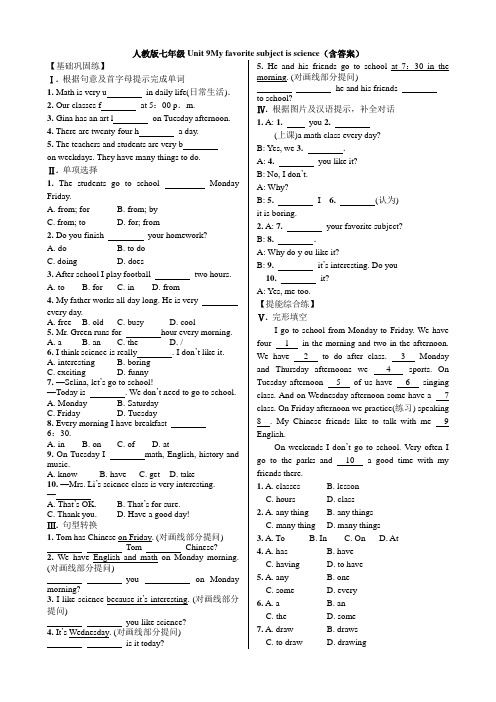
人教版七年级Unit 9My favorite subject is science(含答案)【基础巩固练】Ⅰ. 根据句意及首字母提示完成单词1. Math is very u in daily life(日常生活).2. Our classes f at 5:00 p.m.3. Gina has an art l on Tuesday afternoon.4. There are twenty-four h a day.5. The teachers and students are very bon weekdays. They have many things to do.Ⅱ. 单项选择1.The students go to school Monday Friday.A. from; forB. from; byC. from; toD. for; from2. Do you finish your homework?A. doB. to doC. doingD. does3. After school I play football two hours.A. toB. forC. inD. from4. My father works all day long. He is veryevery day.A. freeB. oldC. busyD. cool5. Mr. Green runs for hour every morning.A. aB. anC. theD. /6. I think science is really . I don’t like it.A. interestingB. boringC. excitingD. funny7.—Selina, let’s go to school!—Today is . We don’t need to go to school.A. MondayB. SaturdayC. FridayD. Tuesday8. Every morning I have breakfast6:30.A. inB. onC. ofD. at9. On Tuesday I math, English, history and music.A. knowB. haveC. getD. take10.—Mrs. Li’s science class is very interesting.—A. That’s OK.B. That’s for sure.C. Thank you.D. Have a good day!Ⅲ. 句型转换1. Tom has Chinese on Friday. (对画线部分提问)Tom Chinese?2.We have English and math on Monday morning. (对画线部分提问)you on Monday morning?3. I like science because it’s interesting. (对画线部分提问)you like science?4. It’s Wednesday. (对画线部分提问)is it today? 5.He and his friends go to school at 7:30 in the morning. (对画线部分提问)he and his friendsto school?Ⅳ. 根据图片及汉语提示,补全对话1. A: 1.you2.(上课)a math class every day?B: Yes, we 3..A: 4.you like it?B: No, I don’t.A: Why?B: 5.I 6.(认为)it is boring.2. A: 7.your favorite subject?B: 8..A: Why do y ou like it?B: 9.it’s interesting. Do you10.it?A: Yes, me too.【提能综合练】Ⅴ. 完形填空I go to school from Monday to Friday. We have four 1 in the morning and two in the afternoon. We have 2 to do after class. 3 Monday and Thursday afternoons we 4 sports. On Tuesday afternoon 5 of us have 6 singing class. And on Wednesday afternoon some have a 7 class. On Friday afternoon we practice(练习) speaking 8 . My Chinese friends like to talk with me 9 English.On weekends I don’t go to school. Very often I go to the parks and 10 a good time with my friends there.1. A. classes B. lessonC. hoursD. class2. A. any thing B. any thingsC. many thingD. many things3. A. To B. In C. On D. At4. A. has B. haveC. havingD. to have5. A. any B. oneC. someD. every6. A. a B. anC. theD. some7. A. draw B. drawsC. to drawD. drawing8. A. math B. scienceC. EnglishD. geography9. A. at B. on C. in D. of10. A. finish B. haveC. playD. seeⅥ. 阅读理解1. Bob likes best.A. EnglishB. musicC. artD. P.E.2. Linda thinks that English is .A. boringB. difficultC. interestingD. exciting3. Who is Nick’s P.E. teacher?A. Miss Gao.B. Mr. Zhou.C. Mr. Li.D. Miss Wang.4.How many people are mentioned(被提到) in the passage?A. Three.B. Four.C. Seven.D. Six.5. What does this passage mainly talk about?A. Three students’ favorite subjects.B. Three students’ favorite teachers.C. All the subjects in the school.D. Different teachers in the school.答案Ⅰ.1. useful 2. finish 3. lesson 4. hours 5. busyⅡ.1. C考查固定短语。
第9课日汉汉日练习题 人教版日语七年级
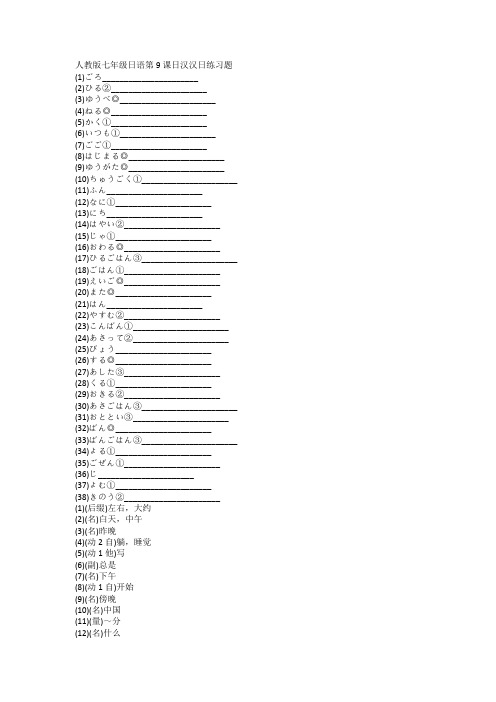
人教版七年级日语第9课日汉汉日练习题(1)ごろ______________________(2)ひる②______________________(3)ゆうべ◎______________________(4)ねる◎______________________(5)かく①______________________(6)いつも①______________________(7)ごご①______________________(8)はじまる◎______________________(9)ゆうがた◎______________________(10)ちゅうごく①______________________(11)ふん______________________(12)なに①______________________(13)にち______________________(14)はやい②______________________(15)じゃ①______________________(16)おわる◎______________________(17)ひるごはん③______________________(18)ごはん①______________________(19)えいご◎______________________(20)また◎______________________(21)はん______________________(22)やすむ②______________________(23)こんばん①______________________(24)あさって②______________________(25)びょう______________________(26)する◎______________________(27)あした③______________________(28)くる①______________________(29)おきる②______________________(30)あさごはん③______________________(31)おととい③______________________(32)ばん◎______________________(33)ばんごはん③______________________(34)よる①______________________(35)ごぜん①______________________(36)じ______________________(37)よむ①______________________(38)きのう②______________________(1)(后缀)左右,大约(2)(名)白天,中午(3)(名)昨晚(4)(动2自)躺,睡觉(5)(动1他)写(6)(副)总是(7)(名)下午(8)(动1自)开始(9)(名)傍晚(10)(名)中国(11)(量)~分(12)(名)什么(13)(量)~日(14)(形1)早(15)(连)那么(16)(动1自)结束(17)(名)午饭(18)(名)饭,米饭(19)(名)英语(20)(副)又,再,也(21)(后缀)~半(22)(动1自他)休息,请假(23)(名)今天晚上(24)(名)后天(25)(量)~秒(26)(动3他)做(27)(名)明天(28)(动3自)来(29)(动2自)起床,起来(30)(名)早饭(31)(名)前天(32)(名)傍晚,晚上(33)(名)晚饭(34)(名)夜晚(35)(名)上午(36)(量)~时,~点(37)(动1他)读,念,阅读(38)(名)昨天( )1.ごろA. (名)上午B. (后缀)左右,大约C. (动2自)起床,起来D. (动1他)写( )2.ひる②A. (名)白天,中午B. (名)今天晚上C. (名)晚饭D. (动2自)躺,睡觉( )3.ゆうべ◎A. (名)白天,中午B. (连)那么C. (名)傍晚D. (名)昨晚( )4.ねる◎A. (名)后天B. (量)~时,~点C. (动2自)躺,睡觉D. (量)~秒( )5.かく①A. (动1他)写B. (名)前天C. (量)~秒D. (名)下午( )6.いつも①A. (名)傍晚B. (副)总是C. (动1自他)休息,请假D. (名)英语( )7.ごご①A. (名)昨晚B. (名)昨天C. (名)下午D. (副)又,再,也( )8.はじまる◎A. (动1自)开始B. (名)傍晚C. (量)~时,~点D. (名)饭,米饭( )9.ゆうがた◎A. (名)傍晚B. (副)又,再,也C. (动3他)做D. (动1他)读,念,阅读( )10.ちゅうごく①A. (名)中国B. (形1)早C. (后缀)左右,大约D. (动1他)写( )11.ふんA. (动2自)起床,起来B. (名)下午C. (名)明天D. (量)~分( )12.なに①A. (名)今天晚上B. (名)晚饭C. (名)什么D. (量)~分( )13.にちA. (量)~时,~点B. (量)~日C. (名)昨天D. (名)下午( )14.はやい②A. (名)夜晚B. (形1)早C. (动2自)起床,起来D. (动2自)躺,睡觉( )15.じゃ①A. (名)昨天B. (副)总是C. (连)那么D. (后缀)~半( )16.おわる◎B. (后缀)~半C. (名)明天D. (动1自)结束( )17.ひるごはん③A. (名)傍晚,晚上B. (量)~日C. (动1他)读,念,阅读D. (名)午饭( )18.ごはん①A. (名)饭,米饭B. (量)~时,~点C. (动2自)起床,起来D. (名)后天( )19.えいご◎A. (名)晚饭B. (名)英语C. (量)~时,~点D. (动1他)写( )20.また◎A. (名)傍晚,晚上B. (副)又,再,也C. (名)夜晚D. (动1自)开始( )21.はんA. (动2自)躺,睡觉B. (后缀)~半C. (名)今天晚上D. (动1自他)休息,请假( )22.やすむ②A. (动1自他)休息,请假B. (名)饭,米饭C. (量)~秒D. (动1他)读,念,阅读( )23.こんばん①A. (名)今天晚上B. (名)早饭C. (量)~分D. (量)~日( )24.あさって②A. (量)~日B. (后缀)左右,大约C. (名)明天D. (名)后天( )25.びょうA. (名)昨天B. (连)那么C. (量)~秒D. (量)~时,~点( )26.する◎A. (名)午饭C. (名)白天,中午D. (名)中国( )27.あした③A. (名)明天B. (名)中国C. (动2自)起床,起来D. (名)白天,中午( )28.くる①A. (名)下午B. (动3自)来C. (名)饭,米饭D. (名)傍晚( )29.おきる②A. (名)昨晚B. (动2自)起床,起来C. (动2自)躺,睡觉D. (名)前天( )30.あさごはん③A. (名)早饭B. (名)下午C. (动1他)读,念,阅读D. (后缀)左右,大约( )31.おととい③A. (名)前天B. (名)傍晚C. (名)后天D. (名)饭,米饭( )32.ばん◎A. (名)英语B. (形1)早C. (名)傍晚,晚上D. (名)白天,中午( )33.ばんごはん③A. (名)上午B. (副)又,再,也C. (动1他)写D. (名)晚饭( )34.よる①A. (连)那么B. (名)夜晚C. (动1自)开始D. (动3自)来( )35.ごぜん①A. (名)早饭B. (名)上午C. (量)~分D. (名)明天( )36.じA. (副)总是B. (量)~时,~点C. (副)又,再,也D. (动2自)起床,起来( )37.よむ①A. (名)前天B. (动1他)读,念,阅读C. (形1)早D. (副)总是( )38.きのう②A. (量)~秒B. (动2自)躺,睡觉C. (动1自)结束D. (名)昨天1.B2.A3.D4.C5.A6.B7.C8.A9.A10.A11.D12.C13.B14.B15.C16.D17.D18.A19.B20.B21.B22.A23.A24.D25.C26.B27.A28.B29.B30.A31.A32.C33.D34.B35.B36.B37.B38.D(1)(动2自)起床,起来______________________(2)(名)昨晚______________________(3)(名)今天晚上______________________(4)(动3自)来______________________(5)(名)英语______________________(6)(后缀)~半______________________(7)(动2自)躺,睡觉______________________(8)(量)~秒______________________(9)(名)午饭______________________(10)(副)又,再,也______________________(11)(名)昨天______________________(12)(名)夜晚______________________(13)(名)晚饭______________________(14)(量)~分______________________(15)(名)上午______________________(16)(名)前天______________________(17)(后缀)左右,大约______________________(18)(名)傍晚,晚上______________________(19)(动1他)读,念,阅读______________________(20)(副)总是______________________(21)(动1自)开始______________________(22)(量)~时,~点______________________(23)(名)白天,中午______________________(24)(名)傍晚______________________(25)(名)什么______________________(26)(连)那么______________________(27)(名)饭,米饭______________________(28)(动1他)写______________________(29)(动3他)做______________________(30)(动1自他)休息,请假______________________(31)(量)~日______________________(32)(名)下午______________________(33)(名)明天______________________(34)(名)中国______________________(35)(名)后天______________________(36)(名)早饭______________________(37)(形1)早______________________(38)(动1自)结束______________________(1)おきる②(2)ゆうべ◎(3)こんばん①(4)くる①(5)えいご◎(6)はん(7)ねる◎(8)びょう(9)ひるごはん③(10)また◎(11)きのう②(12)よる①(13)ばんごはん③(14)ふん(15)ごぜん①(16)おととい③(17)ごろ(18)ばん◎(19)よむ①(20)いつも①(21)はじまる◎(22)じ(23)ひる②(24)ゆうがた◎(25)なに①(26)じゃ①(27)ごはん①(28)かく①(29)する◎(30)やすむ②(31)にち(32)ごご①(33)あした③(34)ちゅうごく①(35)あさって②(36)あさごはん③(37)はやい②(38)おわる◎( )1.(动2自)起床,起来A. おきる②B. あさごはん③C. ねる◎D. ごご①( )2.(名)昨晚A. じゃ①B. ばんごはん③C. ゆうべ◎D. ひる②( )3.(名)今天晚上A. やすむ②B. よる①C. こんばん①D. ひる②( )4.(动3自)来A. ごご①B. えいご◎C. くる①D. ひる②( )5.(名)英语A. にちB. あさって②C. えいご◎D. ばん◎( )6.(后缀)~半A. ねる◎B. はんC. ひるごはん③D. おととい③( )7.(动2自)躺,睡觉A. ごはん①B. ちゅうごく①C. ねる◎D. なに①( )8.(量)~秒A. じB. ひるごはん③C. えいご◎D. びょう( )9.(名)午饭A. えいご◎B. ごはん①C. ごろD. ひるごはん③( )10.(副)又,再,也A. また◎B. ごろC. ひるごはん③D. かく①( )11.(名)昨天A. ひる②B. きのう②C. よむ①D. ゆうべ◎( )12.(名)夜晚A. あさごはん③B. おととい③C. びょうD. よる①( )13.(名)晚饭A. あした③B. いつも①C. ばんごはん③D. ひるごはん③( )14.(量)~分A. ふんB. いつも①C. きのう②D. あした③( )15.(名)上午A. ごぜん①B. おわる◎C. おきる②D. ばんごはん③( )16.(名)前天A. なに①B. おととい③C. よる①D. ふん( )17.(后缀)左右,大约A. おきる②B. なに①C. ごろD. ひるごはん③( )18.(名)傍晚,晚上A. はやい②B. かく①C. ばん◎D. いつも①( )19.(动1他)读,念,阅读A. はじまる◎B. くる①C. よむ①D. ねる◎( )20.(副)总是A. ゆうべ◎B. する◎C. おきる②D. いつも①( )21.(动1自)开始A. はじまる◎B. おわる◎C. おきる②D. びょう( )22.(量)~时,~点A. じB. にちC. ゆうがた◎D. ばん◎( )23.(名)白天,中午A. ひる②B. ねる◎C. ごご①D. くる①( )24.(名)傍晚A. かく①B. ゆうべ◎C. ごぜん①D. ゆうがた◎( )25.(名)什么A. ごご①B. なに①C. また◎D. ゆうがた◎( )26.(连)那么A. ゆうがた◎B. ばんごはん③C. じゃ①D. ちゅうごく①( )27.(名)饭,米饭B. ごはん①C. おわる◎D. くる①( )28.(动1他)写A. ゆうべ◎B. じゃ①C. はじまる◎D. かく①( )29.(动3他)做A. やすむ②B. おきる②C. きのう②D. する◎( )30.(动1自他)休息,请假A. ひるごはん③B. びょうC. やすむ②D. かく①( )31.(量)~日A. よる①B. こんばん①C. ごろD. にち( )32.(名)下午A. おととい③B. えいご◎C. ごご①D. よむ①( )33.(名)明天A. はやい②B. いつも①C. する◎D. あした③( )34.(名)中国A. おきる②B. にちC. じゃ①D. ちゅうごく①( )35.(名)后天A. ごぜん①B. ひるごはん③C. あさって②D. にち( )36.(名)早饭A. はやい②B. ふんC. あさごはん③D. ねる◎( )37.(形1)早A. ひるごはん③C. ごご①D. やすむ②( )38.(动1自)结束A. ゆうがた◎B. なに①C. おわる◎D. ゆうべ◎1.A2.C3.C4.C5.C6.B7.C8.D9.D10.A11.B12.D13.C14.A15.A16.B17.C18.C19.C20.D21.A22.A23.A24.D25.B26.C27.B28.D29.D30.C31.D32.C33.D34.D35.C36.C37.B38.C。
